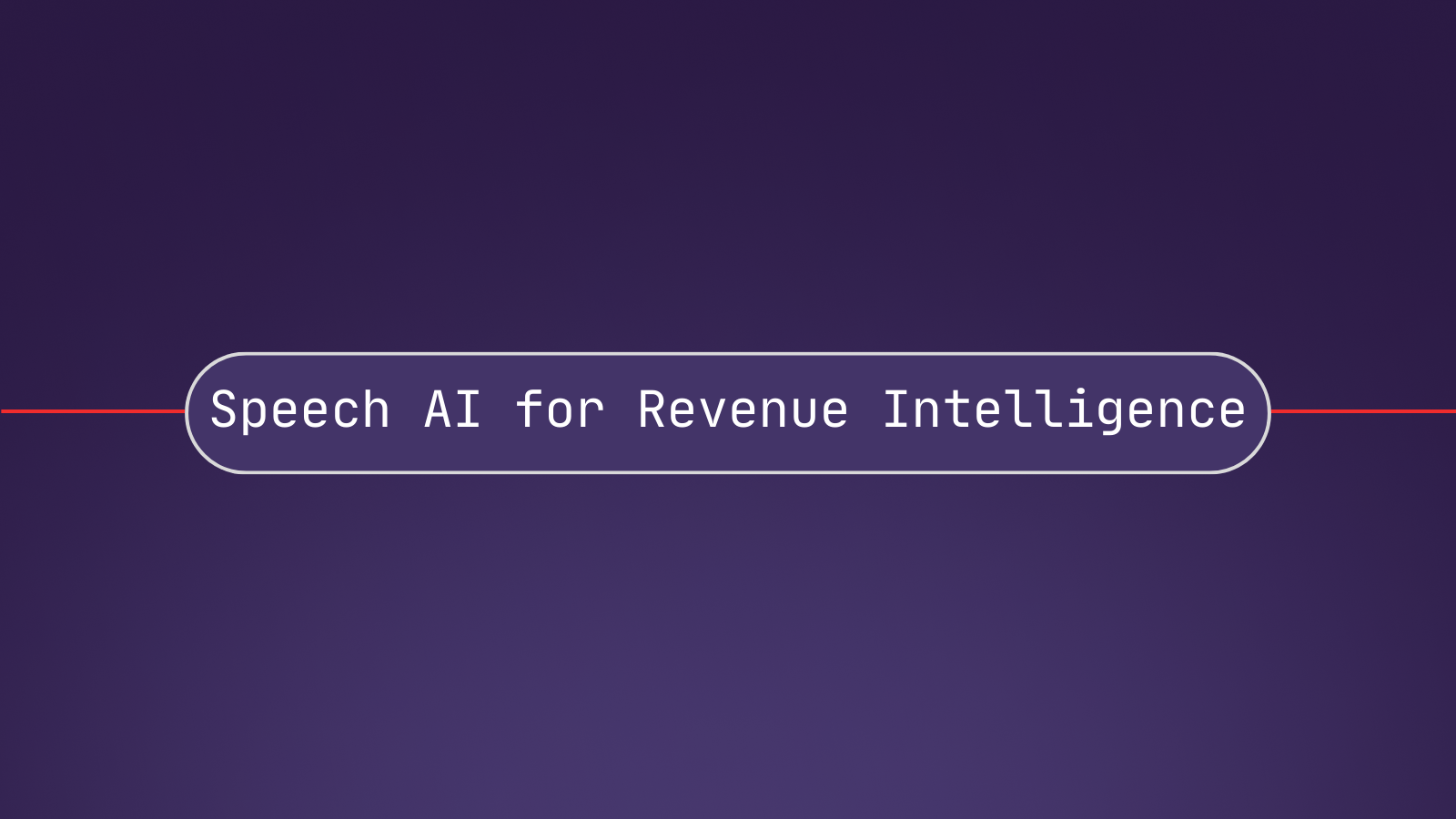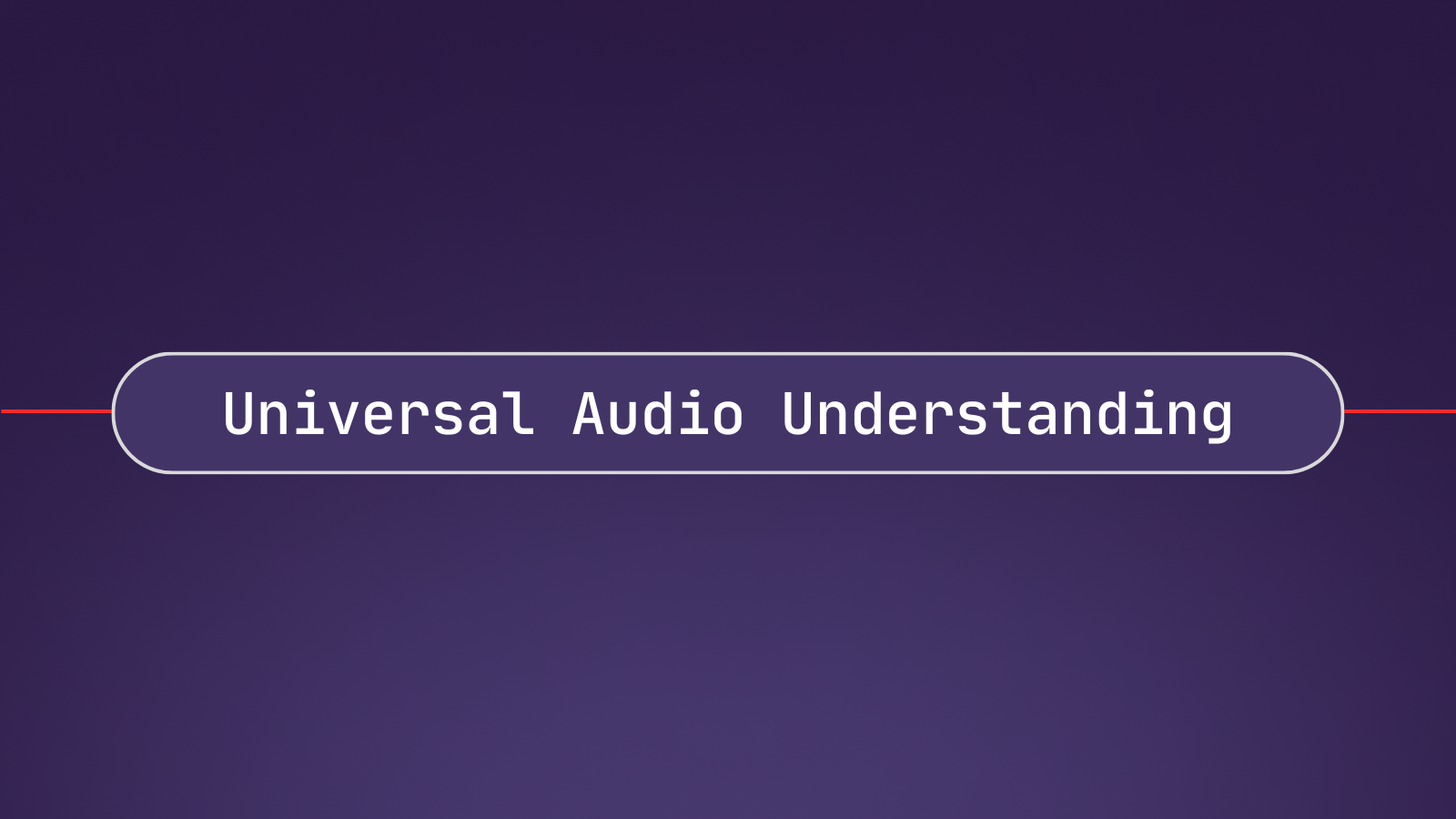In today’s fast-paced, competitive sales environment, sales, marketing, and customer success teams need immediate and complete visibility into their deals. Many teams are turning to revenue intelligence tools and platforms to help.
Using a suite of tools, revenue intelligence platforms can help sales teams easily collaborate, spot risks and opportunities in potential deals, create accurate forecasts, coach reps to meet their numbers, and automate manual tasks.
This article examines what revenue intelligence is more closely and explores the different ways advanced Speech AI technology can enhance revenue intelligence platforms and features.
What is revenue intelligence?
Revenue intelligence refers to intelligent tools built with Artificial Intelligence (AI) models that accomplish five main goals, according to Gong:
- To replace manual data collection with automation, AI, and ML.
- To replace limited views of customer interactions with the whole picture.
- To acquire real-time data for intelligent decision-making.
- To make decisions based on true customer opinions and actions that are supported by data.
- To connect an entire company and its decision-making through this data.
Why is revenue intelligence important?
Sales teams today have an overwhelming amount of data available to them. Typically, the data is outdated by the time someone has a chance to look at it (most of the data in a CRM is already five days old). And because this data isn’t collected systematically, it only represents a tiny percentage of lead opinions or actions, so the data isn’t representative of the entire target population. This practice makes it difficult to truly understand the thinking and behavior of high-quality leads.
Revenue intelligence platforms solve this challenge by offering tools built with powerful AI models that can find patterns and intelligent insights within this data so sales teams don’t have to do it themselves.
The top revenue intelligence platforms can help sales teams realize a 44% average increase in win rates and 38% reduction in sales cycle length.
Top 3 benefits of Speech AI for Revenue Intelligence
Processing enormous amounts of voice data is time-consuming, but revenue intelligence platforms can leverage Speech AI models to build robust tools that drive more efficiency and automation for their users.
But first, what is Speech AI? Speech AI refers to the following:
- Highly accurate AI Speech-to-Text models that automatically transcribe video and audio streams, like sales calls, into a readable transcription text.
- Audio Intelligence models that let product teams quickly build high-ROI features and applications on top of their audio data. This includes AI models for detecting important entities in a text, identifying sentiments spoken by speakers, summarizing text, and more.
- Large Language Models (LLMs) that help users build Generative AI features on top of spoken data, such as custom summaries, action items, question/answer, and more.
Let’s look more closely at the top benefits Speech AI models can have for revenue intelligence.
1. Automatically identify important sections of calls
Revenue intelligence platforms must be able to help users automatically identify important sections of calls—whether it be places where important questions are asked, objections are raised, or where changes in tone occur. These platforms also need to intelligently analyze conversations to determine buying patterns and identify potential churn risks.
Audio Intelligence models such as Summarization, Topic Detection, and Sentiment Analysis, as well as frameworks for applying LLMs to spoken data like LeMUR, can be used to help build such tools.
Summarization models distill lengthy text, like a call transcript, into its most important parts.
Summarization models are great for building tools that make calls easier to skim and/or navigate, especially when performing QA.
Topic Detection identifies common topics in a transcription text, helping users understand context and identify buying patterns. Topic Detection models can be used to build tools that help determine if certain topics do (or not) lead to more sales, cause questions or objections, and more.
Sentiment Analysis detects positive, negative, or neutral sentiments in a transcription text, by speech segment and/or speaker.
For example, the speech segment:I love traveling to New York City would be labeled as a positive sentiment.
Sentiment Analysis models can help identify changes in tone in a transcription—where did a call change from positive to negative? Are more positive sentiments associated with certain topics? Then, this data can be used to build tools that determine patterns and identify corresponding actions.
Large Language Models, or LLMs, can be used to build customizable Generative AI tools. For example, LeMUR, a framework for applying LLMs to speech data, provides a Custom Summary endpoint. This allows product teams to build tools that allow users to customize the summary format they receive, such as a summary of the highs and lows of a call, key pain points, or aggregate summaries of all call data.
Watch a video to learn how to analyze a conversation with AI for free in the AI playground2. Increase efficiency on digital selling tasks and generate deal-specific insights
Revenue intelligence Platforms also need tools that can efficiently synthesize data to generate actionable, deal-specific insights for sales teams. Tools built with AI models such as Entity Detection, Summarization, and Sentiment Analysis can be used to generate real-time data for strategic analytics, which can then be leveraged by users to better identify and score winnable deals.
Entity Detection models (A) identify and (B) classify specified information in a transcription text. For example, lawyer is an entity that is classified as occupation. Common entities that can be detected include personal and organization names, locations, addresses, phone numbers, languages, dates, nationalities, and more.
Entity Detection models can be used to build Revenue intelligence tools that automatically sort through a transcription text to uncover gaps in the sales process, identify trends, and turn this data into actionable insights.
Similar to what is described above, Summarization models can also help facilitate a smarter sales process by helping teams identify trends in conversations.
Sentiment Analysis can provide an overview of attitudes toward products, events, or even specific sales representatives.
3. Optimize coaching with relevant data insights to keep customers engaged
Finally, revenue intelligence platforms should also build tools that help optimize a sales team's performance and boost customer engagement and experience.
Summarization, Topic Detection, Sentiment Analysis, Entity Detection models, as well as LLMs, can be used together to build products that help sales teams better understand the true impact of every sales conversation.
Do customers respond better to certain topics or entities? Do certain agents have more success employing positive or neutral sentiments? Audio Intelligence models can be used to build tools that unlock this insight for users in close-to-real time. This data can be analyzed and aggregated by additional revenue intelligence tools to inform whether to replicate and scale the successful behaviors or refocus and retrain on the less successful ones.
Building robust revenue intelligence tools with AI
Sales, marketing, and customer success teams must be equipped with powerful tools to win deals in a saturated market.
By building with Speech AI, product teams can create smarter revenue intelligence tools and platforms that automate conversation transcription and provide strategic, high-utility analytics that help teams meet and exceed sales goals.







